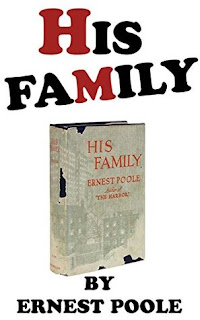His Family
The very first Pulitzer Prize for fiction was given 100 years to the now forgotten Ernest Poole. I just read the winning book, His Family, and while it does have the overly melodramatic flourishes that one associates with the time period, it was a pretty good book.
Poole was a progressive, part of the muckraker movement, and it is visible in this novel. The story is that of Roger Gale and his three daughters. Gale is a well-to-do man living the good life in New York City. His daughters are Edith, who in the beginning of the book has just given birth to her fifth child; Deborah, who is single and devoted to her school and the impoverished students who attend, and Laura, a flighty girl who impulsively marries and moves off to Europe.
Gale, a widower, is always worried about his girls. Over the course of the book there will be a tragedy, as well as a divorce, which is completely shocking to the class that the Gales move in: "Sinning? Yes, she was sinning! Laura had broken her marriage vows, she had 'run off with another fellah.' Those were the plain ugly facts. And now, divorced and re-married, she was careering gayly on! And her views of the war were plain heathenish! And yet there was something about her—yes, he thought, he loved her still! What for? For being so happy! And yet she was wrong to be happy, all wrong! His thoughts went 'round in circles."
The main character of the book, other than Roger, is Deborah. She has put off marriage because she considers the children of her school her own. Finally she weds a doctor, Allan Baird, and realizes, when she has a child of her own, that she will put it ahead of her charges. She is forward-thinking, dragging her father along with her: "He had a deep aversion for those millions of foreign tenement people, always shoving, shoving upward through the filth of their surroundings. They had already spoiled his neighborhood, they had flowed up like an ocean tide."
Of course, by the end of the book, Roger will soften, going so far as to practically adopt a young crippled man, who will become indispensable at his company.
The shadow of war looms over this story. It appears that the book ends before the U.S. entered World War I, but its long-reaching effects reach Roger and his family, practically wiping him out. But he does own a farm in New Hampshire, which is something of an escape for all of the family.
The story is that of soap operas, but that doesn't have to be a pejorative--this is a good soap opera. I generally connected with and felt for the characters. Late in the book Deborah will go through a difficult childbirth and I practically held my breath wondering how the she and the baby would come out of it.
While this first prize winner is neglected today, it really shouldn't be. It's a good read, and full of humanity. It may even draw a tear or two.
Poole was a progressive, part of the muckraker movement, and it is visible in this novel. The story is that of Roger Gale and his three daughters. Gale is a well-to-do man living the good life in New York City. His daughters are Edith, who in the beginning of the book has just given birth to her fifth child; Deborah, who is single and devoted to her school and the impoverished students who attend, and Laura, a flighty girl who impulsively marries and moves off to Europe.
Gale, a widower, is always worried about his girls. Over the course of the book there will be a tragedy, as well as a divorce, which is completely shocking to the class that the Gales move in: "Sinning? Yes, she was sinning! Laura had broken her marriage vows, she had 'run off with another fellah.' Those were the plain ugly facts. And now, divorced and re-married, she was careering gayly on! And her views of the war were plain heathenish! And yet there was something about her—yes, he thought, he loved her still! What for? For being so happy! And yet she was wrong to be happy, all wrong! His thoughts went 'round in circles."
The main character of the book, other than Roger, is Deborah. She has put off marriage because she considers the children of her school her own. Finally she weds a doctor, Allan Baird, and realizes, when she has a child of her own, that she will put it ahead of her charges. She is forward-thinking, dragging her father along with her: "He had a deep aversion for those millions of foreign tenement people, always shoving, shoving upward through the filth of their surroundings. They had already spoiled his neighborhood, they had flowed up like an ocean tide."
Of course, by the end of the book, Roger will soften, going so far as to practically adopt a young crippled man, who will become indispensable at his company.
The shadow of war looms over this story. It appears that the book ends before the U.S. entered World War I, but its long-reaching effects reach Roger and his family, practically wiping him out. But he does own a farm in New Hampshire, which is something of an escape for all of the family.
The story is that of soap operas, but that doesn't have to be a pejorative--this is a good soap opera. I generally connected with and felt for the characters. Late in the book Deborah will go through a difficult childbirth and I practically held my breath wondering how the she and the baby would come out of it.
While this first prize winner is neglected today, it really shouldn't be. It's a good read, and full of humanity. It may even draw a tear or two.



Comments
Post a Comment